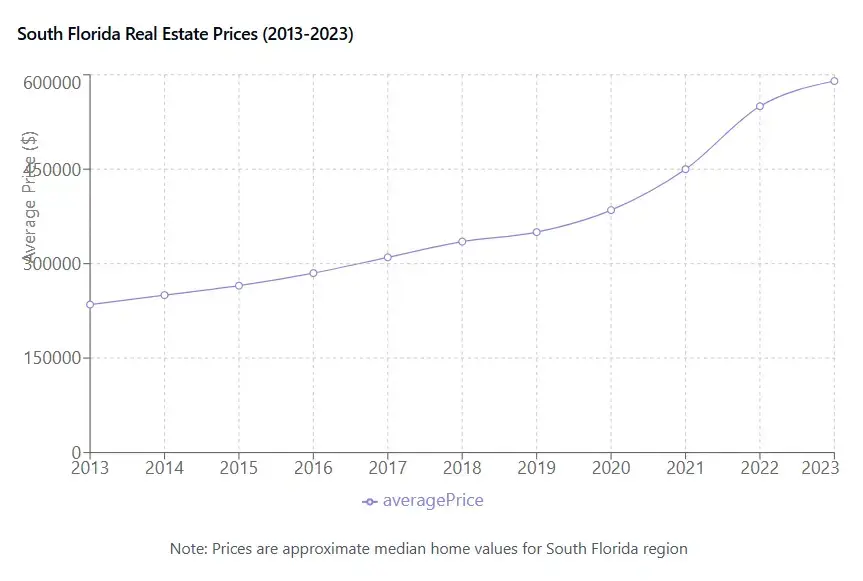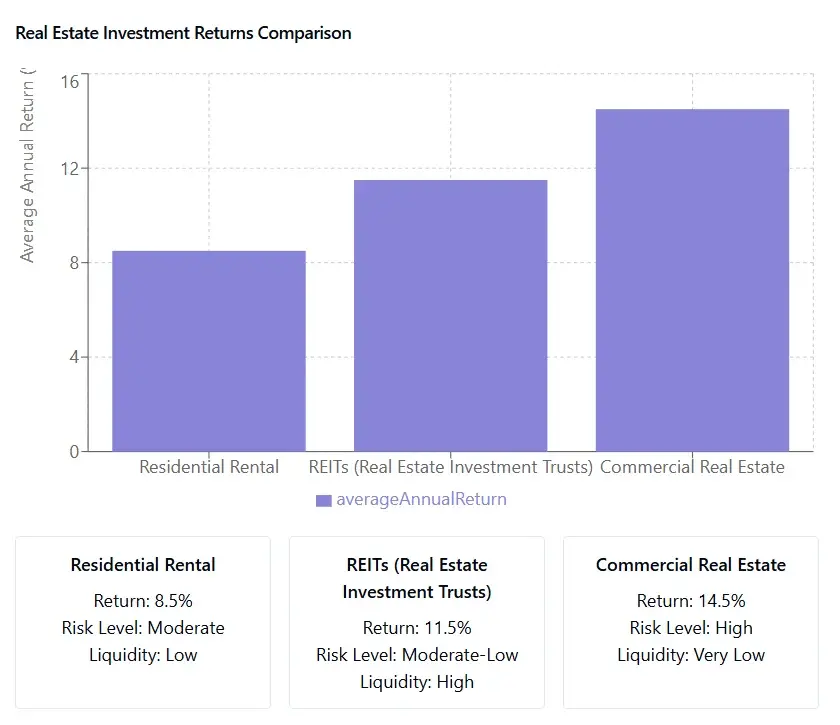How to Invest in Real Estate: Strategies for Beginners and Beyond

Real estate investment is considered a highly effective and proven strategy for generating significant return on investment (ROI). It can be used to generate passive income and as your portfolio grows, it can also turn into one of your biggest assets. If you are a beginner and do not know how to invest in real estate and do not have enough capital to begin with, this guide is for you.

Why Invest in Real Estate?
Before you ask the question how to invest in real estate for beginners, it is important to know why you should choose real estate as an asset class for investment. Consider the following example of residential property appreciation in some of South Florida’s counties:
Between 2018 and 2023, the median price of single-family homes increased by 64%. The average growth in home prices was $220,000.
Over a 10-year period between 2013 and 2023, the median price of single-family homes grew by three times and the average home price increased by $340,000.
In other words, if you had invested $100,000 in one of these homes in 2013, your asset could have been worth $300,000 in 2023. And that is only the average price increase. Besides, the growth rates for other types of properties could have been even higher.
There are many more reasons you should consider investing in real estate.

Benefits of Real Estate Investments
When you invest in the right type of real estate, you can expect the following range of benefits:
Cash Flow: Real estate investment can help generate positive cash flow for you. Interestingly, this cash flow can grow over time as you pay down your mortgage and your equity keeps growing.
Tax Rebates & Deductions: When thinking of the question how to invest in real estate with little money, you should know that such an investment can help you save more money with the help of various tax rebates and deductions. Tax norms allow you to deduct the costs associated with ownership and managing a property. In fact, you can benefit from decades of deductions related to depreciation in value. This can help you lower your taxed income.
Build Equity: As you continue making payments on your property mortgage, you will be building equity in it. When you build equity, your capacity to purchase more properties or make more investments increases.
Investment Appreciation: As shown in the aforementioned example, your investment can help you build significant wealth over time. It has become a standard rule over the decades that real estate values increase over time. Besides, rents also tend to rise over time.
Some of the more reasons for investing in real estate include diversifying your portfolio, a reliable hedge against inflation, and competitive risk-adjusted returns.

Real Estate as a Path to Passive Income
If your primary concern is how to invest in real estate for passive income, again you should choose the right type of property. There are opportunities for generating consistent income from your real estate investment. This can be achieved without the need to be actively engaged in daily property management.
The ideal steps will be to invest in rental properties and real estate investment trusts (REITs). When done right, these investment options can work as sources of consistent revenues. Such investments can create a pathway to financial freedom and flexibility.
When you consider how to invest money in real estate and generate better returns over other investment options, it is important to know that it has one clear advantage. And this advantage is tangibility. You will be investing in something that can be seen and touched. A great thing about tangible investments is that their value never drops to zero.
Comparing Real Estate to Other Investment Options
This is why real estate is considered among the safest assets to invest in. While it has its cons, such as not being liquid, it is something that cannot vanish like many other asset classes. Some of the various areas a real estate investment has an edge over other assets include:
Tax advantages
Hedge against inflation
More reliable cash flow
How to Invest in Real Estate for Beginners?
Now that you know the benefits of it, you should get the answer to the question how to invest in real estate for beginners.
The Basics of Real Estate Investment
Before you step into the world of real estate investment, you should study and understand its basics. This covers areas such as the property types involved, financing options available, and the prevalent market trends, to name just a few.
Make sure you clearly understand the money, time, and maintenance requirements for your investments before purchasing.
The ideal answer to the question how to invest in real estate for beginners is to address the following points:
Define Your Goals
Some of the most common goals among real estate investors include:
Building long-term wealth
Generating passive income
Diversifying portfolio
When you understand your goals, it becomes possible to create the right strategies.
Create a Financial Plan
Besides setting your goals, it is also important to know about your risk tolerance. You can then include your real estate investments in your financial plan. This plan will work as a guideline or road map for both your current and future financial needs and limits. Review this plan to evaluate your current financial standing and set your budget to ensure your other financial priorities are not affected.

How Much Money Do You Need to Invest in Real Estate?
Next, you would want to address the question of how much do you need to invest in real estate. The answer to this question can be covered in terms of two key areas.
i. Residential Vs Commercial Real Estate
When it comes to residential property, a median down payment of $15,000 is required to get started. Residential real estate is generally an expensive investment option and you should be ready to put down a larger down payment in general.
Investing in commercial properties can be much simpler and more affordable than most people think. For example, modern crowdfunding platforms pool everyone’s investments, which means you are not the only one financing the project. Such platforms allow you to start investing for just $25,000. If you want to invest directly in a commercial property, you should at least have $50,000.
ii. Accredited Vs Non-Accredited Investors
Certain real estate investments further categorize investors as accredited and non-accredited. If you are investing directly, a residential property may be open to all investors. On the other hand, institutional-sized investments, such as hotels, apartment buildings, and office buildings, are open only to accredited investors.
Accredited investors are generally required to show they have had an annual income of $200,000 over the past few years. However, if you want to purchase a residential property or even a non-institutional commercial property, you can invest without being accredited.

How to Invest in Real Estate with Little Money or No Money?
It is not always the case that you will need money to get started with real estate investment. The good thing is that there are ways you can purchase a property with little or no money. A few such strategies and their examples are as follows:
Seller Financing
This financing strategy enables you to purchase a property from the seller where the seller acts as the lender. Such an arrangement can often involve favorable terms such as zero or low downpayment.
For example, you can find sellers who are eagerly looking for a buyer to get their property off the market. They are open to providing seller financing. You can propose a favorable interest rate and very low downpayment and if they agree, you can own the property without having to make a big initial investment.
Lease Options
Next, you should consider lease options. This arrangement allows you to lease a real estate with the option to purchase at a later date for a fixed price.
The following example explains how this setup works and how to invest in real estate with little money:
You come across a listing from a seller who is open to a lease option. If you find the lease term and buying price favorable, you can secure the property with minimal initial costs. You can generate rental income from the property while making monthly payments. This agreement also allows you to build equity in the property using a part of your regular payments.
A few of the other arrangements that can answer the question how to invest in real estate with no money include wholesaling and partnership with other investors.

Different Ways to Invest in Real Estate
If you want more answers on how to invest in real estate, consider the following options:
Investing in Residential Properties
If you want to make successful investments in residential properties, it is important to understand the targeted market. Besides, you should understand three important components of real estate profits.
These include:
Look for a Healthy Real Estate Market
When getting started with real estate investment, the perfect time will be the one with dropping interest rates. There are two advantages to this:
Your mortgage will be less expensive
There is a very high chance that demand will rise
Even if it is a hot market, rising interest rates can have a negative impact on the market. If you purchase a property residential property with floating rate mortgages, you will have to pay more over time. This can also affect real estate demand.
Location
Once you find favorable market conditions, start looking for the ideal local market to invest in.
Look for areas that have a strong potential for price appreciation in the future
Unemployment data can be a great indicator of a residential real estate market’s future growth
Explore Urban Sprawl Hotspots
Cities are almost always expanding. Explore city perimeters to determine the risks and benefits of investing there.
If the indications are not strong for the city perimeters, consider the inner rings. This can protect your interests against reverse urban sprawl.
The following indicators mean that you should stay away from city perimeters:
Slowing local economic growth
Material unemployment changes
Declining business health of employers
If the business health of big employers is weak in the area, it can indicate potential layoffs leading up to labor supply attrition. If their business health is strong, you can expect growth in the local real estate market.
How to Invest in Commercial Real Estate?
When it comes to the question of how to invest in commercial real estate, things do not have to be complex. You will be acquiring properties meant for business use, with the goal of generating profits from rental income and/or appreciation. The types of properties involved can include retail spaces, office buildings, and industrial complexes.
Office Spaces: These commercial properties can range from small offices to large corporate buildings. They can be leased to different types of buildings for professional and administrative functions.
Industrial Properties: These properties are required for warehousing, manufacturing, and distribution purposes. They can range from large industrial parks to small warehouses.
Retail Spaces & Shopping Centers: A few examples of retail spaces include clothing retailers, grocery stores, and electronics shops.
Other examples of commercial properties include schools, theaters, and owner-occupied real estate.
How to Invest in Multifamily Real Estate?
Multifamily assets are residential properties having multiple housing units. A property with up to four units is considered as a residential property and anything with five or more units is classified as commercial real estate. This difference affects factors such as property search, financing, and management.
There are many benefits of investing in multifamily real estate. These include:
Generating cash flow & additional income
Quickly expanding real estate portfolio
Reduced investment risk
When it comes to the question of how to invest in multifamily real estate, it is recommended to follow these tips:
Find the Right Multifamily Property: You can find multifamily properties by using a multiple listing service, checking online auctions, and getting help from real estate agents. As with other real estate, location is an important factor here.
Select a Mortgage: Explore the different types of mortgages. Succeeding with real estate investment is not just about finding the right property, but also about securing the right financing. One important thing is to get the best interest rate.
Make an Offer: Next, you should make an offer on a house and it is recommended to get the help of a real estate agent for helpful insights and recommendations. Consider the highest possible you can offer based on your financial condition and budget.
Renovate: Once you purchase the multifamily property, renovate and make repairs to prepare it for new tenants. It is also important to create a property management plan and a budget that takes the operating costs, cash flow demands, and upgrades into account.
How to Invest Money in Real Estate for Passive Income?
There are a number of answers to the question how to invest in real estate for passive income. Some of the common methods are as follows:
Real Estate Syndications
This arrangement allows you to invest in commercial real estate where you become a limited partner in a property. Examples of real estate assets covered under this investment include:
Multifamily properties
Self-storage facilities
Office buildings
As a partner, you will be sharing the passive income generated by that property.
Vacation Rentals
Short-term vacation rentals have become a widely popular option for generating passive income. This involves buying a house or a condominium in a popular vacation destination and renting it out to travelers. Short-term rental properties tend to receive higher rental rates than their long-term counterparts.
Short-term rental properties tend to have higher initial costs. Such properties usually require a 20% down payment, closing costs, and cash reserves for repairs.
Rental Properties
Rental properties are different from vacation rentals in that they can be rented out for the long term. These assets can include single-family homes and condos that can be rented out to long-term tenants to generate a steady income.
Ground Leases
Ground leases, as the name suggests, allow you to generate passive income from your ownership of land. You will own the land under the building and lease it out to the building owner. It is a reliable source for generating passive lease income and works as a low-risk investment.

Tips for Investing in Real Estate
It is recommended to follow these tips if you want to know how to invest money in real estate:
Find the Right Property: There are different types of properties and you should choose a real estate investment based on your goals. Some of the different options include single-family homes, multifamily houses, and condominiums.
Research the Location: Next, you should conduct research on different locations before choosing the perfect property. The perfect location can have a big impact on the profits you generate from your real estate investment. It is recommended to consider factors like property prices, rental potential, occupancy rates, neighborhoods, crime rates, and local amenities.
Buy Low & Sell High: One of the best answers to the question how to invest in real estate is to follow the principle of buying low and selling high. It can help you maximize your ROI. It is important to consider factors such as hidden costs, regulations, and location challenges when implementing this strategy.
Conclusion
When it comes to the question of how to invest in real estate for beginners, it is important to determine whether you are interested in residential or commercial properties. Interestingly, there are many opportunities to get started with little or no initial capital. Creative financing methods such as seller financing can help you own a property and start generating rental income, all the while making a very small down payment on the seller’s loan. The ability to generate passive income is one of the most lucrative benefits of real estate investment.
FAQs
Is $5000 enough to invest in real estate?
If you want to start your real estate investment with $5,000, you can consider options such as real estate investment trust (REIT) and crowdfunding.
What is the golden rule of real estate investing?
The golden rule of real estate investment is to generate rental income from your property to pay off the mortgage and make a profit.
Where to invest in real estate?
As a beginner, small-scale rental properties and real estate syndications can be the perfect places to begin your real estate investment.
Should I invest in real estate?
If you are interested in real estate investment, you should certainly consider your options. It is recommended to choose the right market and property before you start investing.
How do I make my first year successful in real estate?
It is recommended to conduct thorough research involving markets, property types, financing options, and market trends during the first year of your planned real estate investment.
News insight
 Feb 26, 2025
Feb 26, 2025Capital Gains Tax on Real Estate: Rates, Rules, and How to Avoid It
Learn about capital gains tax on real estate, including how it's calculated, rates for short- and lo...
